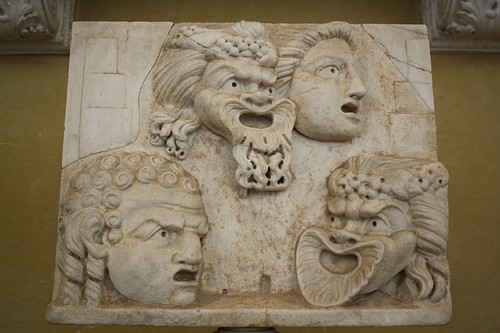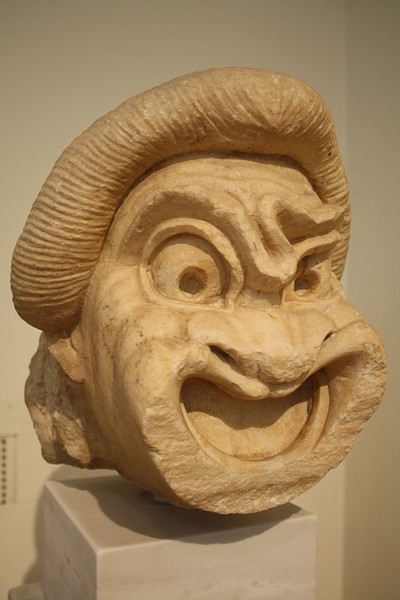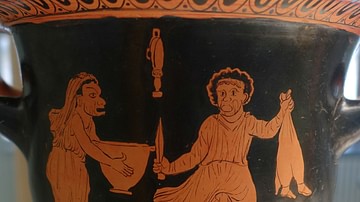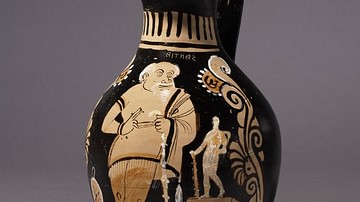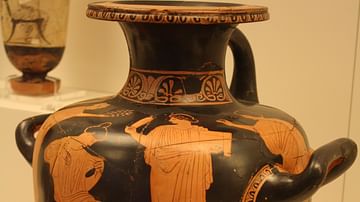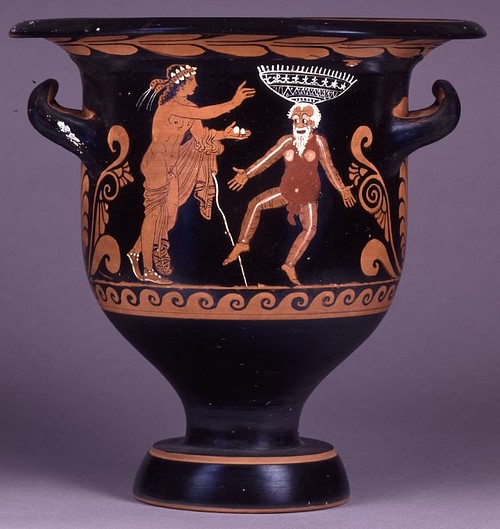
Ancient Greek comedy was a popular and influential form of theatre performed across ancient Greece from the 6th century BCE. The most famous playwrights of the genre were Aristophanes and Menander and their works and those of their contemporaries poked fun at politicians, philosophers, and fellow artists. In addition to maintaining their comic touch, the plays also give an indirect but invaluable insight into Greek society in general and provide details on the workings of Greek government, political institutions, legal systems, religious practices, education, and warfare in the Hellenic world. Uniquely, the plays also reveal to us something of the identity of the audience and show just what tickled the Greeks' sense of humour. Finally, Greek comedy and its immediate predecessor Greek tragedy would together form the foundation upon which all modern theatre is based.
The Origins of Comedy Plays
The precise origins of Greek comedy plays are lost in the mists of prehistory, but the activity of men dressing as and mimicking others must surely go back a long way before written records. The first indications of such activity in the Greek world come from pottery where decoration in the 6th century BCE frequently represented actors dressed as horses, satyrs, and dancers in exaggerated costumes. Another early source of comedy is the poems of Archilochus (7th century BCE) and Hipponax (6th century BCE) which contain crude and explicit sexual humour. A third origin, and cited as such by Aristotle, lies in the phallic songs which were sung during Dionysiac festivals.
A Comedy Play
Although innovations occurred, a comedy play followed a conventional structure. The first part was the parados where the chorus of as many as 24 performers entered and performed a number of song and dance routines. Dressed to impress, their outlandish costumes could represent anything from giant bees with huge stingers to knights riding another man in imitation of a horse or even a variety of kitchen utensils. In many cases, the play was actually named after the chorus, e.g., Aristophanes' The Wasps.
The second phase of the show was the agon which was often a witty verbal contest or debate between the principal actors with fantastical plot elements and the fast-changing of scenes which may have included some improvisation (if references to specific audience members are taken as being to individuals actually present in the theatre). The third part of the play was the parabasis, when the chorus spoke directly to the audience and even directly spoke for the poet. The show-stopping finale of a comedy play was the exodos when the chorus gave another rousing song and dance routine.
All performers were male professional actors, singers, and dancers and they were helped in their endeavour to represent a vast variety of human and non-human characters by wonderful costumes and highly decorated face masks. The main actors - one protagonist (who took the lion's share of the limelight) and two other actors, performed all of the speaking parts. On occasion, a fourth actor was permitted but only if non-instrumental to the plot. These restrictions were to ensure equality in competition and keep down the costs to the state which funded the professional actors. The chorus, costumes, musicians, and rehearsal time were funded by an appointed private citizen, a khorēgos, which was a role carrying great prestige.
Due to the restricted number of actors then, each performer had to take on multiple roles which involved fast changes of costume and the use of recognisable character masks such as those for slaves or gods like Hercules and Hermes. In addition, some masks may well have been decorated to represent in caricature certain contemporary figures that the poet wished to poke fun at. Masks did, however, deprive the actor of using facial expressions and consequently the use of voice and gesture became extremely important. Costumes were another important visual part of the performance, and the most common were padded with tights and a short tunic which revealed a false and exaggerated phallus (connected with Dionysian ritual) - a detail clearly seen on many comic scenes represented on Greek pottery.
Plays were performed in an open-air theatre (theatron) such as that of Dionysos in Athens and seemingly open to all of the male populace (the presence of women is contested). The presence of theatres in towns across the Greek world and finds of terracotta theatre masks also suggest that comedies (and of course tragedies) were widely performed. In a Greek theatre, the semicircle of seats created a central area known as the orchestra and it was here that the chorus performed. The main actors performed on a raised stage with a background provided by the skēne - a two-storey structure which also provided various entrance points for the actors and provided a means to change costume unobserved by the audience. There was some movement between these areas as the Chorus might occasionally climb the stage, and actors could also enter the orchestra via the public entrances or parodoi at each side of the theatre.
Comedy in Competition
During the 5th century BCE, at major religious festivals such as the City Dionysia and the Lenaea, comedies were performed in competition over three days. First five and later three comedies were entered for competition, a comic play being performed at the end of the day after the tragedy and satyr plays. Plays were judged by a panel of ten judges chosen by lot and they voted by placing pebbles in an urn. Five urns were then chosen at random to decide the final winner.
Old Comedy
Oh would some god, with sudden stroke,
Convert me to a cloud of smoke!
Like politicians' words I'd rise
In gaseous vapour to the skies.
(50, Act One, Scene One, The Wasps by Aristophanes)
Old Comedy refers to plays written in the 5th century BCE. The earliest surviving complete play is Aristophanes' Acharnians, first performed in 425 BCE, and citations from surviving fragments of earlier plays can be dated no earlier than c. 450 BCE.
The plot of comedies usually stretches reality in terms of time and place, jumping incredible geographic distances and rapidly changing scenes. Fantastical elements such as giant creatures and improbable disguises are mixed with references to the audience which delivers a roller-coaster ride of satire, parody, puns, exaggeration, colourful language, and crude jokes. Indeed, as the plays were popular entertainment, they reveal some of the popular language used by the Greeks, language not usually found in more serious written material. Any public figure was fair game it seems, and even Greek mythology and religion could be made fun of. However, despite this high degree of free speech, certain aspects of religion such as the Mysteries and the higher gods such as Zeus and Athena seem to have been off-limits for the comic poet.
New Comedy
Sometime in the late 4th century BCE, a new style of Greek comedy arrived, although the transition from Old Comedy may have been more gradual than the surviving plays suggest and some scholars propose an intermediary stage called Middle Comedy. Certainly, Aristophanes' final two plays differ in style in comparison to his other plays and provide a transition towards a newer style of presentation. This New Comedy focused more on the plot of the play and often employed recurring stock characters such as cooks, soldiers, pimps, and the cunning slave. The chorus becomes less important to the plot, (providing only musical interludes between acts) and plays seem to settle on an established five-act structure. Another difference is that there seem to be fewer personal attacks (or is that only the impression given by having too few sources to compare with?) which may be due to legislation made specifically to curb this practice. The subject of New Comedy also differed and was more concerned with fictional everyday people and their relations with family, other classes, and foreigners.
The Writers of Comedy
[On modern poets]
Small fry, I assure you, insignificant squeakers and twitterers, like a lot of swallows. A disgrace to their art. If ever they are granted a chorus, what does their offering at the shrine of Tragedy amount to? One cock of the hind leg and they've pissed themselves dry. You never hear of them again.
(159, Act One, Scene One, The Frogs by Aristophanes)
The giant of Greek comedy is Aristophanes. Little is known for certain about him, but from the dates of his plays, we may surmise that he lived from 460 to 380 BCE and was from Athens. Eleven of his plays survive complete, and these are the only surviving examples of the Old Comedy genre. Seen by some (notably Aristotle) as rather crude, the plays, nevertheless, reveal Aristophanes' sharp wit, and they often comment on the inconsistencies and ridiculous aspects of society and public figures. The politician Cleon, the philosopher Socrates, and the tragedy playwright Euripides were the three figures most often found in Aristophanes' comic sights.
Other important playwrights of Old Comedy include Cratinus (whose works include Cheimazomenae 426 BCE, Satyrs 424 BCE, and Pytine 423 BCE) and Eupolis (Numeniae 425 BCE, Maricas 421 BCE, Flatterers 421 BCE, and Autolycus 420 BCE) both of whom were multiple winners at the most prestigious festivals.
We know much more about the New Comedy writers, many of whom were prolific and sometimes wrote more than 300 plays. The most important poets include Philemon (c. 368/60 - 267/3 BCE), the author of 97 comedies, Diphilus who wrote around 100 plays, and Philippides. However, the writer of this genre whose work survived longest is Menander (c. 342-291 BCE). Philemon actually won more festival victories than Menander, but it is the latter who came to be considered the great poet of New Comedy. He wrote around 100 plays and many survived up to the 7th century CE when unfortunately they were lost to posterity. The Dyskolos (originally performed in 316 BCE) is the most complete surviving play and significant portions of six other plays also survive.
The popularity of Menander is attested by over 900 quotations preserved in secondary sources and his works were frequently adapted by later Latin playwrights. Famous for his imaginative situations, fast-moving dialogue, suspense, and attention to private domestic dramas, he often included a romantic lead, typically a young single male (in contrast to Aristophanes' heroes who are usually middle-aged and married). In addition, Menander's comedy often hinted at the importance the author gave to tolerance and understanding in our social relations.
The Legacy of Comedy
Greek Comedy would continue to be popular through Hellenistic and Roman times with many of the classic plays being re-performed again and again. Latin comedies were written most famously by Plautus and Terence, and the genre diversified into various other forms of comic theatre such as pantomime and togata.
